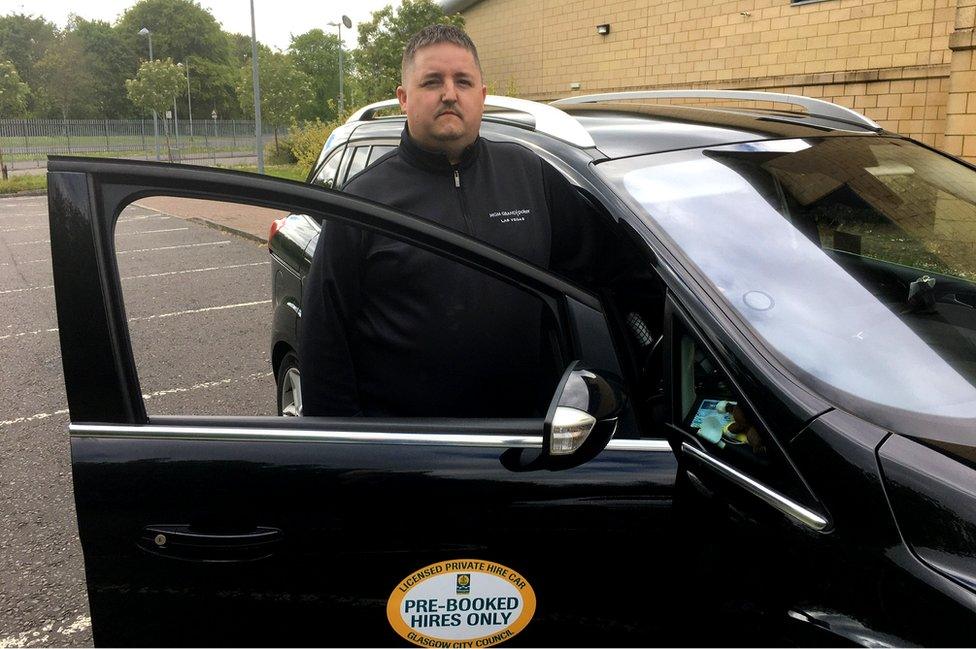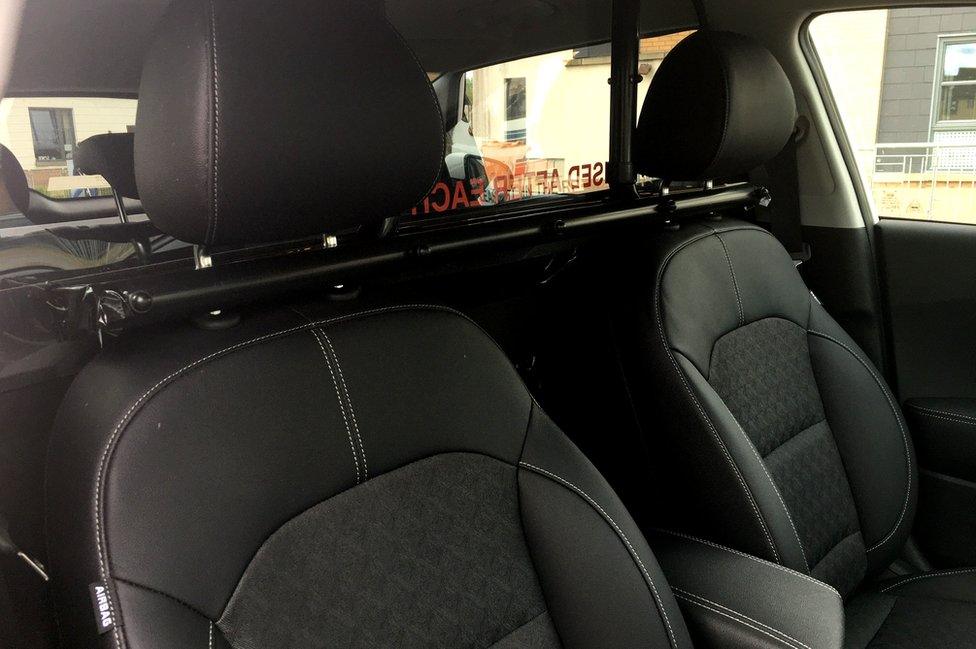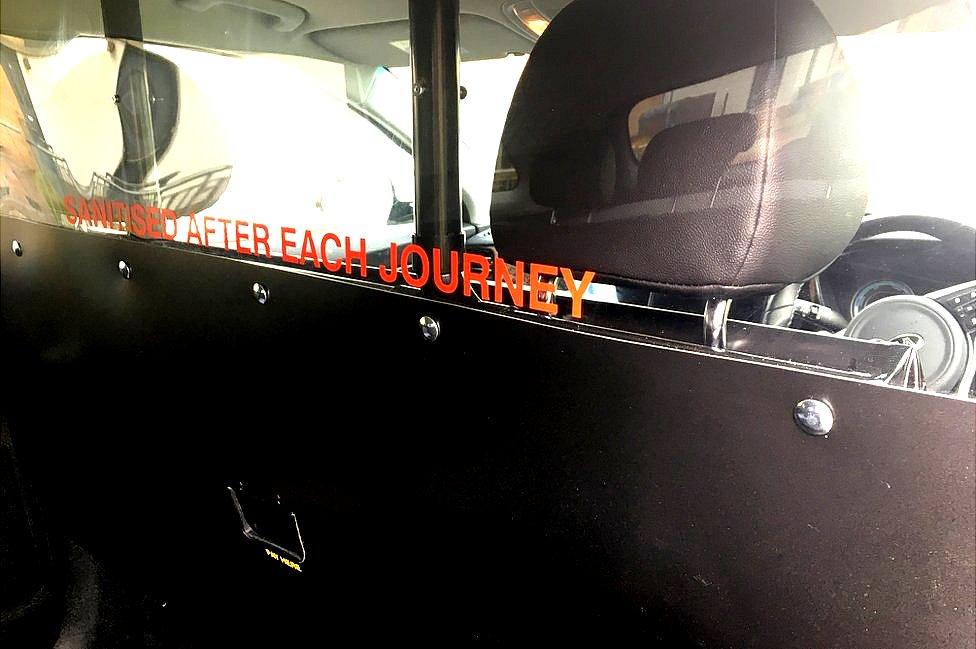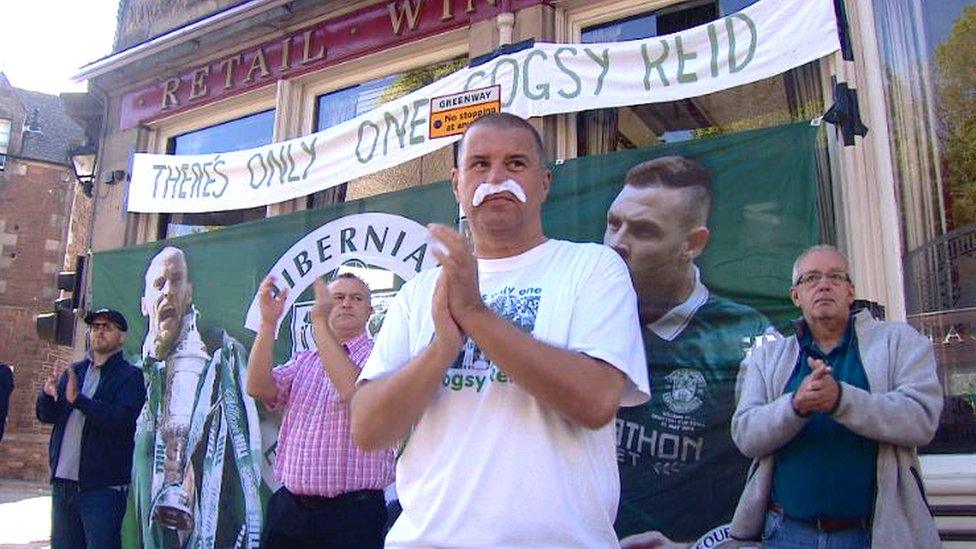Coronavirus: 'You can't stay two metres from a taxi driver'
- Published

Barry Sloan wants the advice to be made official so that taxi drivers can fit protective screens
Scottish taxi drivers are asking for urgent clarity on anti-coronavirus measures for private hire cabs.
Taxi owners want the Scottish government to intervene and allow them to install protective screens in their vehicles.
The drivers' trade association wants to use a crash tested screen design which has been approved by insurance companies and which is already allowed by some English councils.
No official guidance has been given.
'Most vulnerable profession'
Maintaining a two-metre (6ft) gap between driver and passenger is not possible inside a private hire car and the risks are very real.
The Office for National Statistics in England found that security guards, chefs and taxi drivers were the most vulnerable professions in terms of Covid-19 death rates, with male taxi drivers dying at a rate of more than 36 per 100,000.
United Private Hire Drivers which represents many drivers in Scotland says there have been six coronavirus deaths among private hire and taxi drivers north of the border, with half of them in Glasgow.
Barry Sloan, the association's Glasgow rep, was shocked by the deaths and is now demanding that something is done to protect private hire drivers across Scotland.

Drivers want to fit protective screens between the driver and passengers to stop the spread of the virus
He already wears a mask when passengers are in his mini cab, but says drivers need screens to protect themselves and their customers.
He said: "We have been in contact with the council since week one of Covid-19. We agree that if screens have to be installed it is going to have to be regulated in some way. The two screens we took to them were both crash-tested and have also had risk assessments done on them.
"Exactly what the council asked for, we replied with those and the response we got was that they were now seeking government guidance."
Approved design
But he said that the Scottish government has been slow in issuing guidance for all sectors which work in close proximity with customers.
The association has asked the Scottish government for guidance and is yet to receive a response.
Allow X content?
This article contains content provided by X. We ask for your permission before anything is loaded, as they may be using cookies and other technologies. You may want to read X’s cookie policy, external and privacy policy, external before accepting. To view this content choose ‘accept and continue’.
Mr Sloan's favoured design is by taxi fitters Cabcare, who've already supplied private hires in a number of English councils but so far are not being authorised by councils in Scotland despite the design being approved by nine major insurance companies.
Kirkintilloch-based Elliot Farmer is Cabcare's sales director.
He said: "It's soft and bendable and it is not going to break in any impact. It is fitted to every car and to the driver - so it means they are comfortable driving the car. You can see there is no obstruction to space in the back because it is moulded into the car.
He added: "Up to this point every single insurance company that's been contacted by a driver has had no objections to it. We have all the information on the materials used, the simulation crash testing and at the moment we think we are the only company that has done this.
"This is not going away tomorrow. This is long-term. It could be a year before we go back to some kind of normality."

Taxi drivers are one of the most at-risk professions when it comes to contracting coronavirus
At last Thursday's Scottish government coronavirus briefing, Nicola Sturgeon promised to bring some clarity and consult with drivers, but also pointed out that local councils are the licensing authorities.
But for their part one of the largest taxi licensing authorities, Glasgow City Council, said they fully understood the anxiety but were waiting for guidance from the Scottish government.
'Between 20 and 30 hires a day'
Glasgow transport consultant Dave Holladay says local authority discretion is fine in normal times but in this Covid-19 emergency a national approach is urgently needed.
He said: "Nobody has taken the issue by the scruff of the neck and said this is how we manage the risk.
"The average private hire is picking up between 20 and 30 fares a day with one driver. If that driver is infected, he is infecting 20 or 30 passengers, or if one of those passengers is infected they infect the cab and the driver and the next passengers that pass through that cab. This is why we should be putting together guidance for taxi licensing."
The Scottish government told the BBC they were taking the issues with taxis very seriously and were reviewing the published guidance daily to ensure the spread of the virus was contained. The spokesperson said they were looking at how to make secure safe workplaces across a whole range of sectors, including for private hire drivers.
- Published11 May 2020
